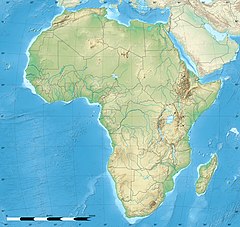User:Ursus4spelaeus/sandbox
Old Oyo is the site of the capital city (1400-1835) of the Oyo Empire in modern-day Nigeria. Established by Yoruba groups migrating from the city of Ile-Ife, the city was the seat of authority for the Alaafin, or custodian/keeper of the palace.
Significance
[edit] Survey by Brian Hallam | |
| Alternative name | Old Oyo, Oyo-Ile, Oyo Katunga, Oyo-Oro |
|---|---|
| Location | Old Oyo National Park, Oyo State, Nigeria |
| Type | Capital, City |
The inspiration for the metropolitan, urban center that Old Oyo was, comes from Yoruba history. The legend and history of Ile-Ife (Ile meaning home and Ife meaning expansion) originates in the original expansion of Yoruba peoples. Ile-Ife was settlement of the Yoruba travellers, absorbing those who were living in the area, and a place that became the Holy City of legend, the place of legendary creation and a center for their culture as they spread from this city to the surrounding lands.[1] In the cities that these Yoruba decesdents established, the idea of a center such as Ile-Ife has been repeated. In this way, Old Oyo was a center for Yoruba culture, the destination of tributes, and the seat of ritual and political rule. [2] In the archeological record, the commonalities in building styles are shown as well. Position of Oyo-Ile gave it more opportunity to participate in slave trade, Dahomey gap. The Alaafin who lived in the major palace complex within Old Oyo was both ruler and judge for their people. [3]
Cultural History
[edit]Old Oyo in Nigeria | coordinates = 8°58′29″N 4°18′27″E / 8.9746°N 4.3076°E
According to the National Commission for Museums and Monuments, Old Oyo historical site is located at the coordinates 8°56'-9° 03' North 4°20'- 4°26'East.
Located in what is now the Oyo state of Nigeria, the national park that preserves this area also extends into the Kwara state.
The Oyo-Ile Kingdom during the crest of its power sponsored new kingdoms, located in Oyo, Egbado, Igbomina regions. [4]
Artifacts
[edit]Creation
[edit]According to The History of the Yorubas, the Oyo-Ile kingdom's founder was Oranmiyan.[5] Reasons for Yoruba migration from cities such as Ile-Ife have been attributed to long droughts or the unselected in a leadership dispute leaving with his adherents. [4] The Afin, the large palace complex, is a Yoruba tradition, while the sprawling market area signifies the role that mercantilism played in the maintenance and central focus of the Oyo empire.
Abandonment
[edit]This city was abandoned in 1835 after its destruction by Fulani attacks. This is what caused the shifting of the seat of power to New Oyo. The destruction of the city comes after a decline in trade and influence, the slave trade declined, the position that Oyo-Ile had in regards to this is what had enabled its prosperity while the surrounding kingdoms had less access, and the kingdoms surrounding Oyo-Ile had been gaining power.[6]
Position in the future
[edit]Areas of cultural history and heritage in Nigeria have been experiencing gradual decay and/or replacement in the recent past. Regeneration of these areas with urban communities can strengthen cultural identity and can help local and national communities access the tourism industry.
With studies on the proximal positions of Fez, Morocco and Kano, Old Oyo can feasibly be renewed. [7]
External Links
[edit]Nigeria's National Parks: Old Oyo
UNESCO: Tentative List, Old Oyo
References
[edit]- ^ Biobaku, Saburi (1958). "The pattern of Yoruba history" (PDF). African South. 2.
- ^ Monroe, J. Cameron (2018-12-01). ""Elephants for Want of Towns": Archaeological Perspectives on West African Cities and Their Hinterlands". Journal of Archaeological Research. 26 (4): 387–446. doi:10.1007/s10814-017-9114-2. ISSN 1573-7756.
- ^ Olukole, Titilayo O. "Cultural Heritage Resources of the New Oyo Empire, Southwestern Nigeria: Prospects for Sustainability". African Diaspora Archaeology Newsletter. 13 (4).
- ^ a b NOLTE, INSA (2011-11). "REEXAMINING THE YORUBA NATION - A History of the Yoruba People. By Steven Adebanji Akintoye. Dakar: Amalion Publishing, 2010. Pp. 512. $64.95, £40.99, €48.50, CFA 25,000, hardback (<scp>isbn</scp>978-2-35926-005-2)". The Journal of African History. 52 (3): 419–421. doi:10.1017/s0021853711000582. ISSN 0021-8537.
{{cite journal}}: Check date values in:|date=(help) - ^ "ORIGIN AND EARLY HISTORY", The History of the Yorubas, Cambridge University Press, pp. 3–14, 2010-09-30, retrieved 2023-10-30
- ^ "Yoruba empire of Oyo". Oxford Reference. Retrieved 2023-10-30.
- ^ Madandola, Muhammed; Boussaa, Djamel (2023-01-19). "Cultural heritage tourism as a catalyst for sustainable development; the case of old Oyo town in Nigeria". International Journal of Heritage Studies. 29 (1–2): 21–38. doi:10.1080/13527258.2023.2169332. ISSN 1352-7258.


